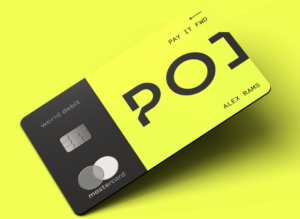Have you ever left an item behind in an Uber or Lyft? What if a credit card could cover you against that kind of loss? Ever bought a ticket to an event and missed it because you were sick or your flight got canceled? Would you use a card that earned suboptimal rewards but offered coverage in those situations? What if it weren’t a credit card, but a debit card offering up to $500 in protection in either situation…and it earned decent rewards? Last night, the Point Debit Card sent out notification that it is changing backing banks and networks and adding those two features along with extended warranty protection and double rewards on its core categories through the end of 2021. I don’t know how they’re doing it, but the Point card has quickly become the highly unexpected darling of my wallet in 2021 and it somehow just keeps getting better.
Is the Point Debit Card too good to be true?
Let me start by saying that the Point Debit Card can’t keep all this stuff up. Yes, they have an annual fee and increased it from $49 to $99, putting it in line with credit card issuers. But unlike credit card issuers, Point doesn’t have other fees from which to earn money: it is a debit card, so there is no interest and the card terms do not allow for overdrafts and as such there is no overdraft fee or any other fee that I can see (and I did spend quite a bit of time reading through terms last night).
Again, I know that it won’t last forever and that is exactly why I’m striking while the iron is hot. I can understand those who will sit out deals that feel too good to be true, but as I’ve written before, I think they’re making a mistake (which is also a topic we’ve discussed on the podcast).
The Point Debit Card has not been perfect. I was incredibly disappointed when they initially were not honoring a fee-free year for readers who signed up via a referral offer that I wrote about. Thankfully, we received a number of reports from readers that Point changed their tune on that and made right by them. I was underwhelmed that there was any difficulty there, but a number of readers still signed up and came out ahead (and indeed those of us who signed up expecting the fee have still come out happily ahead thanks to regular promotions). I don’t what is leading to the change in backing bank, though it isn’t uncommon for FinTech startups to change backing banks (it has happened on debit cards I hold with several FinTechs this year).
Keep in mind that Point Debit Card points are worth 1c each, so 10x is like 10% back. So far just since I signed up (and I’ll note that I was a late adopter), Point has run:
- Point debit card: $30 back on $200 with 5-day streak (this deal has repeated once a month in July, August, September, and October and has represented an easy $60 win in two-player mode each time)
- (EXPIRED) 10% back at Airbnb and Hotel Tonight with Point Debit Card (up to $50)
- (EXPIRED) 10x at coffee shops through 10/3 with Point Debit Card
- Point Debit Card: Earn 15x On Uber Eats Purchases (Ends 10/3/21)
- (EXPIRED) Point Debit Card: Earn 15x On DoorDash Purchases (Ends 9/12/21)
- (EXPIRED) 10% back at Target up to $50 back on $500 with Point Debit Card
- (EXPIRED) 15% back on food delivery apps with Point debit card
- 10x on Tesla Superchargers up to 2500 points with Point Debit Card (still valid in my app)
- (EXPIRED) 10% back at Amazon (up to $50 back on $500) with Point Debit Card
- Ongoing returns like 5x at Amazon, Costco, Best Buy, Whole Foods, Trader Joe’s, Etsy, and a lot more (and temporary returns like the current 20x on HBO subscriptions). Note that there are periodic limitations on all of these deals.
It’s been easy money. In 2-player mode, it adds up. I have not expected the hits to keep coming, but I’m happy to have the band play on for at least my first year (at which point I’ll have to re-evaluate whether or not to pay a second annual fee). If the train keeps chugging along, I’ll stay on board and ride this one out.
Again, I fully expect that the party will be over at some point. I’m not going to move my life savings to Point (though I would expect the end of the party to be rewards drying up, not money vanishing). I’ve said all along that while points are currently worth $0.01 each, the key is that the value of points could change at any time. I’ve recommended readers redeem points for cash rather than let them sit as points. I haven’t followed that advice as meticulously as I’ve recommended in the hopes that Point wows us one day with point transfers, but that’s probably a foolish hope. Taking one cent today probably makes more sense than hoping it gets even better. Though the card itself did just get even better in the short term.
Double rewards through 12/31/21
The Point Debit Card has three core bonus categories: subscriptions, ride shares, and food delivery (like Uber Eats and GrubHub) and also typically offers 1x (worth 1% back) everywhere else. However, they are doubling those things through the end of 2021 (note that it isn’t clear to me whether that starts immediately or only once you receive your new Visa debit card in the next couple of weeks, though I suspect the double rewards is tied to the Visa). I’ll be keeping my eye out for the new card in the mail because for the rest of the year the Point Debit Card will offer:
- 10x points (worth 10% back) on subscriptions (changing my Spotify card!)
- 6x points (worth 6% back) on rideshares and food delivery (combined with the new protection benefit, this is awesome)
- 2x points (worth 2% back) on everything else
Getting 2% back on “everything else” on a debit card is awesome. Especially at the end of the year. I haven’t yet tried making tax payments with my Point card (and note that there are daily and monthly limits on debit card use, so don’t get too excited), but the timing here seems great for that.
I’ll also be happy to get the 10x and 6x returns on the associated categories. In fact, I may just have to switch my Uber and Lyft payment method to Point thanks to….
Rideshare protection
The new benefit about which I’m most excited is Rideshare Protection. I’m not aware of this benefit on other cards (if readers know of other cards offering it, please let me know in the comments). You can read full terms on this benefit here. Rideshare protection has two key elements:
- It protects you in case of an accident in a rideshare car or damage to your stuff ($300K in travel accident insurance)
- It protects your stuff if you lose it in the rideshare car (up to $500 per claim)
The accident protection may not seem critical to those who have travel insurance and/or use a credit card with good travel protections. However, when I started researching whether other cards have rideshare protection, I read several articles suggesting that most travel insurance actually doesn’t cover rideshare services. The explanation I read was that a rideshare car is owned by the operator and unlike a taxi it is not considered a “common carrier” by most insurances. I don’t know that to be true, but if it is then Point’s rideshare protection could be really important. I think anyone who has taken enough rideshares has had at least one or two instances with a sleepy or dangerous driver. Being protected in case that driver is uninsured or underinsured gives at least some peace of mind.
But more commonly useful and interesting to me is the second piece: coverage against items lost in the Uber / Lyft / rideshare car. I typically double check that I’ve got everything before the driver pulls away, but I have a strong fear that one of these days, particularly with the chaos of traveling with kids, I’m going to leave something important behind in an Uber. Luckily, I haven’t had that experience yet, but I’m sure there are some readers who haven’t been so lucky.
If you do leave something behind in an Uber, there is a pretty simple procedure for reporting it with Uber (I assume the same is true with Lyft): you click on your profile (I see an image of myself in the top right corner of the app), then “Trips”, then select one of your trips and click “Find Lost Item”. Uber will ask for your callback number and they will attempt to connect you to the driver’s phone (if you reach their voicemail, be sure to leave your callback number as the driver will not otherwise see it). Uber then charges a $15 fee (that goes entirely to the driver) for the item to be returned if your driver has found it.
However, what if the driver doesn’t call you back / doesn’t find the item? While you can apparently continue to follow up with Uber, the Point Debit Card now offers up to $500 in protection for items left behind. Terms require you to report the lost item with Uber within 24 hours, so if you only realize a few days later that you lost an item you will be out of luck. However, if you realize and report the loss within 24 hours, you should be eligible to submit a claim with Point. That’s fantastic for peace of mind.
The $500 cap will not completely cover many of today’s flagship phones or nicer laptops, but it sure beats $0. I feel like it is only a matter of time before this happens to me and I’ll be glad to have some coverage in case it does.
It is worth noting that if I choose to use my Point card, I would be sacrificing better rewards: through March 2022, the Chase Sapphire Reserve is offering 10x on Lyft rides. It had been so long since I’d made use of Lyft that I’d forgotten all about that until a reader on Twitter reminded me of that the other day. There is no doubt that 10x Ultimate Rewards is far more valuable than 6x Point points. If I would have a large volume of Lyft rides, I would probably lean toward using the CSR. However, at a base cash value of $0.01 each, I’d need to take $12,500 worth of rides at 10x to earn $500 more in Ultimate Rewards points than I would earn in Point points at 6x. Still, if I think it is unlikely that I’ll lose anything in a rideshare car, it would make more sense to take the more profitable return of the CSR. I’m just not uber confident about that (see what I did there?).
Because I know that I am somewhat forgetful and that trait gets amplified when installing and uninstalling car seats and setting up a stroller and working to keep a crying baby or cranky toddler placated, I’d probably use the Point card at least while earning 6x (though I should note that it is unlikely that I’ll be in a rideshare car with my family before the end of 2021 — that’s more of a theoretical example).
Event Ticket protection
As a parent who knows that the sharing learned in school eventually extends beyond blocks and books to include sniffles and stomach bugs, I was also intrigued to see that Point is adding Event Ticket Protection. This is a feature that used to exist on Citi credit cards, but that went the way of the dodo bird a couple of years ago.
The marketing blurb for Event Ticket Protection says it will cover you for a canceled concert (or other ticketed event), though in the actual benefit terms it says that this benefit covers you if you miss an event for which you have tickets for one of the following reasons:
- Sickness, Accidental Injury or Death of the Ticket Holder or Ticket Holder’s Family Member
- Ticket Holder is directly involved in a traffic accident while en route to the Covered Event (as evidenced by a police report).
- Ticket Holder’s public transportation (including airplane, train, bus, subway) is delayed due to strike, industrial action, breakdown or adverse weather conditions causing the Ticket Holder to miss the Covered Event.
I don’t see “canceled concert” in that list, so I’m not sure that a canceled event would actually be covered despite the marketing blurb Point is putting out. Still, it is a great benefit when you miss an event for one of the above reasons as this benefit covers up to $500 per ticket, up to $2,000 per event and up to $4,000 per year. That seems like a fair amount of coverage for a debit card.
You’ll obviously need to pay for your tickets with your card and the benefit won’t cover you if the ticket is printed on a button or wristband or if the ticket doesn’t specify the name, date, time, and cost of the ticket. It also will not cover tickets purchased for resale. They will require your receipt and unused tickets for a claim. I wonder how that works for an event where you expected to pick up your tickets at the Will Call window (is that still a thing in 2021?) but your flight gets canceled and you don’t make it. Hopefully I won’t find out, but I would be happy to take 1% cash back (or 2% through the end of the year) and also protection in case I miss the event.
Unfortunately, sign up isn’t a great deal
Unfortunately, signing up for the Point Debit Card isn’t a great deal right now and hasn’t been for the past couple of months. Over the summer, when the annual fee was still $49, there was an easy $100 sign up bonus that only required making a single purchase. In two-player mode, that meant a $200 win (P1 got the $100 welcome bonus when singing up through someone’s referral and then referred P2 and got $100 for the referral plus P2 got $100 for using the debit card. Both paid a $49 fee, making for a net $201 win). However, the current offer isn’t nearly as good: if you sign up through a referral, you get $100 after spending $1,000 in the first 30 days — but you still pay a $99 annual fee. That means the sign up bonus is really like $1 and it comes at the cost of having to spend $1K on the card in the first month. That’s poor.
I’m not sure whether Point will offer a better welcome offer. I would hope they do, but on the other hand in recent months it seems they have focused on offering increased payouts and Streak opportunities rather than improving the intro bonus. It’s hard to say whether something better will return. My instinct is that it might be worth waiting to see if they offer something better when the Visa card launches in a couple of weeks, but if you are interested in getting the card sooner rather than later, here are our referral links:
- Stephen’s wife’s link (code: SPEPPER4)
- Nick’s link (code:NREYES6)
- Note that if you click through those links on Desktop, you’ll want to make sure that you add the promo code after downloading the app and before signing up. See more detail in this post).
Please don’t post referrals in the comments — we want to keep the comments for discussion related to the card and benefits rather than the comments section becoming a sea of referrals.
Bottom line
In addition to the benefits noted in this post, Point is adding extended warranty protection, though I have enough cards that offer that feature that I’d probably rather use a different card for that purpose. I am much more intrigued by Rideshare Protection and Event Ticket Protection because those are benefits that I don’t think are duplicated on any of my credit cards. I have to admit that the Point Debit Card keeps impressing me. It hasn’t all been a smooth road — increasing the fee from $49 to $99 (and then initially refusing to honor a $0 fee referral offer) made me skeptical. However, the card keeps beating returns on other cards in my wallet and the monthly opportunities for $30 back on $200 have added up in two-player mode to be worth well more than the fee. The Point Debit Card will not become the primary card in my wallet and I’m not going the Dave Ramsey route of eschewing credit cards. I’ll still carry plenty of plastic and use my cards to maximize value in the right situations, but these new benefits on the Point card mean that I can earn a reasonable return while also getting protections missing from my credit cards, which is a compelling reason for me to have and keep using my Point card.






I haven’t seen offers being addd in the past month or two – is it just me or the ‘too good to be true’ just finally catch up?
Question – If it’s 2x on “everything” does that mean Costco, Best Buy, etc become 10x and just weren’t listed? Or it’s 2x on non-bonused, plus 2x on a couple specific categories?
Also, regarding “how” they’re making money, is it possible they’re (1) Selling customer data – even if it’s just cumulative data, and (2) Having retailers cover the full cost of promotions? I would imagine Best Buy would be happy to take a 5% discount to push customers their way? Just thinking through it…
Most likely 2x on “everywhere else” i.e. non bonused spend.
Here’s the relevant part of the post:
They are just doubling the three permanent bonus categories and the “everywhere else” earn rate. They aren’t doubling temporary payouts. While they have perpetually repeated stuff like 5x Costco and Best Buy, those offers always have an end date (and typically a cap of 5,000 points / $50 back per earn period).
So, again, no, it will not be 10x at those things. It’s 10x subscriptions, 6x ride share / delivery services, and 2x (2% cash back) on other purchases. I’m sure they will still have those “Access Offers” for 5x back at certain places, but they aren’t doubling those.
And I doubt Best Buy is financing the Best Buy Offer or else they’d be doing that with Chase, Amex, etc. I imagine Best Buy does fund Amex Offers and Chase Offers, but if they were happy with a permanent 5% discount for people who aren’t Best Buy credit card holders, I imagine we’d have seen that with another issuer already. Much more likely is that venture capital is funding those 5x payouts and they won’t last forever so you may as well take your piece of the pie while it’s fresh out of the oven and being sliced.
Interested to see if the 5x Costco still exists with the new Visa. That’ll be nice for in-store since right now the Mastercard can only be used at Costco.com. (I know you can do Costco cash online but this cuts a step)
I’ve used my point card at Costco. Remember they take all debit cards (Pin-Based).
Here I’ve been wasting time! Thanks
Financial services has historically been about trust. I get that younger generations may be more likely to bestow that trust upon new apps and companies that may not have yet earned it, but I’m not there. I’m ok with missing out on 10 percentage points of rebate on my modest subscription expenses.
I don’t know as though younger generations are more likely to bestow trust upon new apps as much as they are skeptical that any large company is worth much trust. I’m not telling you to be cavalier with your finances — I understand your perspective and it may serve you well. I just mean to say that it’s not that I “trust” Point (indeed I recommend cashing out points sooner rather than later because what I do know is that points may become devalued). Trust just isn’t a metric that matters a lot to me, especially when I’m not investing large sums of money or giving up information that isn’t pretty widely available.
That’s not to say that trust doesn’t ever matter — it does to some extent in some situations. Again, I think you’re absolutely right that there is a generational difference on that.
I guess I might just consider more things to be elements of trust. Like trusting that they are going to be in business long enough to make good on any of the promises of redemption value, insurance coverage etc. that they are making and trust that the scheme won’t completely change by the time your rewards are ready to be harvested if the company runs low on seed money and starts cutting back quickly.
It takes time to learn new incentive programs, open accounts, call cust svc to sort through problems, transfer funds, set up payments, set reminders, remember to bring certain cards on which shopping trips, following up to make sure you got the reward you were supposed to etc. At least when you make that investment of time and mental energy into Amex, Chase or Citi, you can be reasonably assured the incentives you thought you’d get will mostly be there in the end.